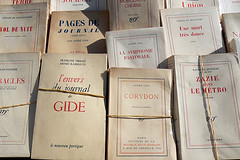February 16, 2010
Lost In Translation
There are plenty of English-language writers who sell a lot of books overseas—it's not uncommon for even lesser-known American authors to get their novels translated into multiple languages. But the reverse doesn't hold nearly as well. Only a very small fraction of foreign-language authors ever manage to get published in the United States. The last two literary Nobelists, Herta Müller and J.M.G. Le Clézio, weren't widely available in English until after they won their prizes (at which point publishers scrambled to crank out translations). Why does the flow mainly go in one direction? It doesn't seem to be because Americans are boors. Emily Williams, a former literary scout, offers up a more subtle explanation:

There has been a hegemony for years of English-language books being translated into many other languages, a cultural phenomenon comparable (though much smaller in scale) to US dominance of the worldwide film market. Bestselling American authors like Michael Crichton and John Grisham and Danielle Steele and Stephen King have, in translation, reliably topped bestseller lists around the world. As the market for matching these authors to publishers abroad matured, it opened the door to less commercial writers and other genres (in nonfiction, for example, American business books continue to be in high demand).As a result, many countries abroad have editors and scouts who are focused on selecting U.S. books for translation. They can develop a deep expertise in the U.S. market. But on the flip side, foreign books come to the U.S. market from a whole slew of different countries and languages, so it's harder for a single editor to really know any one country or region really well and have a sense for which books will do well here. As a result, says Williams, the foreign-language books that do get translated into English often get picked via haphazard connections—an agent here has a close tie with a particular agent in Spain (say).
A certain savvy in picking the right American books to translate developed into a valuable editorial skill in markets abroad. Imprints and publishing strategies were then established to capitalize on books in translation. Foreign rights turned into a profit center for US publishers, and scouting agencies sprang up to help navigate the increasingly complex marketplace.
The rising fortunes of US books abroad coincides with the rise of American pop culture in general, but also has to be partly attributed to a strong culture of commercial fiction… that, until quite recently, simply didn’t exist in many other countries. A foreign editor I worked with once compared US commercial fiction to Hollywood blockbusters: any one book might be better or worse overall, but there’s a certain level of craftsmanship you can depend on.
Granted, there are still far more foreign-language books translated into English each year than you or I could ever hope to read. But it seems likely that there's a very high number of undiscovered gems out there in other countries—books from Latin America or Europe that could catch on here and garner critical acclaim (or start a craze the way Roberto Bolaño has done recently), but simply haven't made it into English by sheer bad luck.
(Flickr photo credit: christing-O-)
